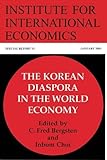The Korean diaspora in the world economy / edited by C. Fred Bergsten and Inbom Choi.
Material type: TextLanguage: English Series: ; 15 | Special reports (Institute for International Economics) ; 15Publication details: Washington, DC : Institute for International Economics, 2003 Description: xi, 158 pages ; 23 cmISBN:
TextLanguage: English Series: ; 15 | Special reports (Institute for International Economics) ; 15Publication details: Washington, DC : Institute for International Economics, 2003 Description: xi, 158 pages ; 23 cmISBN: - 0881323586
- 9780881323580
- HC 467.95 K84 2003
| Item type | Current library | Home library | Collection | Shelving location | Call number | Copy number | Status | Date due | Barcode |
|---|---|---|---|---|---|---|---|---|---|
 Libro
Libro
|
Biblioteca Juan Bosch | Biblioteca Juan Bosch | Ciencias Sociales | Ciencias Sociales (3er. Piso) | HC 467.95 K84 2003 (Browse shelf(Opens below)) | 1 | Available | 00000024755 |
Includes bibliographical references and index.
Preface vii
Acknowledgments xi
Prelude The Korean Diaspora and Globalization: Past Contributions and Future Opportunities
1 (8)
C. Fred Bergsten
Korean Diaspora in the Making: Its Current Status and Impact on the Korean Economy
9 (22)
Inbom Choi
Comments on Chapter 2
28 (3)
Taeho Bark
Chinese Business Networks and Their Implications for South Korea
31 (30)
Young Rok Cheong
Comments on Chapter 3
56 (5)
Kihwan Kim
The Impact of Korean Immigration on the US Economy
61 (16)
Marcus Noland
Comments on Chapter 4
73 (4)
Soogil Young
The Status and Role of Ethnic Koreans in the Japanese Economy
77 (24)
Toshiyuki Tamura
Comments on Chapter 5
98 (3)
Jang Hee Yoo
The Economic Status and Role of Ethnic Koreans in China
101 (30)
Si Joong Kim
Comments on Chapter 6
128 (3)
Byong Hyon Kwon
The Global Economic Outlook and Business and Investment Opportunities for Overseas Koreans
131 (14)
C. Fred Bergsten
Marcus Noland
II SaKong
About the Contributors 145 (4)
Index 149
Koreans living in the United States have generated an increase of about 15 to 20 percent in trade between the United States and Korea. This is one of the surprising conclusions reached in this special report, which, upon the 100th anniversary of the migration of Koreans from their homeland, looks at the impact of the 6 to 7 million people who make up this diaspora on both South Korean and overseas economies. No country in history has ever succeeded in building a developed and high-income economy without participating in the global economy; globalization is imperative for economic success. And one of the largest elements of globalization, in addition to international trade and investment, is migration.
In The Korean Diaspora in the World Economy , experts hold up South Korea as one of the most dramatic examples of that experience, having gone from being a poor, underdeveloped country fewer than 40 years ago to becoming a postwar economic success story. This report also looks at South Korea's role as a regional trading partner and its present and future relations with North Korea.


There are no comments on this title.